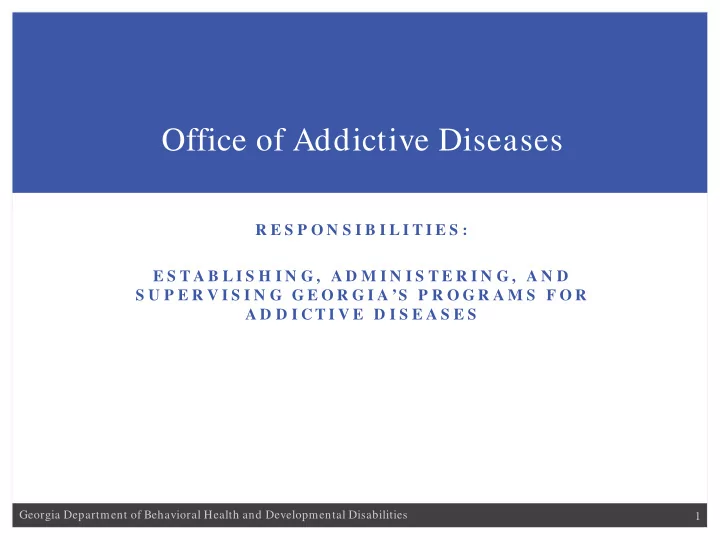

Office of Addictive Diseases R E S P O N S I B I L I T I E S : E S T A B L I S H I N G , A D M I N I S T E R I N G , A N D S U P E R V I S I N G G E O R G I A ’S P R O G R A M S F O R A D D I C T I V E D I S E A S E S Georgia Department of Behavioral Health and Developmental Disabilities 1
Mechanisms The Office of Addictive Diseases contracts with providers in each of DBHDD’s six regions to provide services to men, women, and children who are struggling with a substance use disorder Addictive disease services are funded with both state and federal substance abuse block grant dollars, with specific requirements applicable to the use of block grant Georgia Department of Behavioral Health and Developmental Disabilities 2
Provider Types Tier 1 Tier 2 Tier 2+ Tier 3 Georgia Department of Behavioral Health and Developmental Disabilities 3
Service Areas Adult Women’s Treatment and Recovery Adolescent Georgia Department of Behavioral Health and Developmental Disabilities 4
Adult Service Programs 22 crisis stabilization programs 7 transitional pilot programs: residential/ intensive outpatient program 3 residential withdrawal management programs (detoxification) 33 residential programs (capacity and level of services vary) 3 recovery centers Non-intensive outpatient services Substance abuse intensive outpatient Georgia Department of Behavioral Health and Developmental Disabilities 5
Adult Recovery Support Centers Services: Peer Support Aftercare Educational Assistance Employment Assistance Social Support Activities Transportation (for adults) 3 centers in Georgia Clayton Center Community Service Board (Morrow) Middle Flint Behavioral Healthcare (Americus) STAND, Inc. (Decatur) Georgia Department of Behavioral Health and Developmental Disabilities 6
Medication-Assisted Treatment (MAT) Treatment for opioid use disorder which includes the use of medication, counseling, and other social supports 62 active opioid treatment providers in Georgia DBHDD contracts with two of the 62 to provide medication- supported recovery to the indigent population Approximately 6,000 people in Georgia use medication to support their recovery Georgia Department of Behavioral Health and Developmental Disabilities 7
Women’s Treatment and Recovery Services Residential Outpatient Transitional Housing Georgia Department of Behavioral Health and Developmental Disabilities 8
Women’s Treatment and Recovery Services 22 providers 20 of those are residential sites 13 have outpatient services 12 have transitional housing Highest priority is given to: Pregnant women IV users Women who meet the “needy family” definition, or are TANF recipients CPS involvement Georgia Department of Behavioral Health and Developmental Disabilities 9
Adolescent Services Adolescent Intensive Residential Treatment Programs Outpatient Services Youth Clubhouse Programs Georgia Department of Behavioral Health and Developmental Disabilities 10
Intensive Residential Treatment (IRT) Program 24-hour, supervised, residential, treatment program for adolescents ages 13-17 years old, who are in need of a structured residence due to substance use problem Georgia Department of Behavioral Health and Developmental Disabilities 11
IRT Program Locations George W. Hartman Center (Cobb CSB) Diane Green, Program Director: 770.971.7801 Referrals: 770.422.0202 729 Lawrence Street, Marietta, Georgia 30060 Cobb County/ Region 1 20 male and 10 female beds Boggs Academy – WestCare Georgia Audrey Mack, Program Director Referrals: 706.554.1005 4729 Quaker Road, Keysville, Georgia 30816 Burke County/ Region 2 16 male beds Georgia Department of Behavioral Health and Developmental Disabilities 12
Adolescent Clubhouses Unique and comprehensive substance abuse recovery support model designed to assist adolescents and their families during the recovery process Recovery support services provided include: Peer Support Substance Abuse Aftercare Educational Assistance Employment Assistance Social Support/ Club Activities Transportation Georgia Department of Behavioral Health and Developmental Disabilities 13
Clubhouse Locations Cobb/ Douglas CSB (Cobb & Douglas counties) Pineland CSB (Statesboro – Bulloch County) New Horizons CSB (Columbus – Muscogee County) Highland Rivers (Rome – Floyd County) CETPA (Norcross – Gwinnett County) View Point (Lawrenceville – Gwinnett County) Gateway BHS (Savannah – Chatham County) Avita Community Partners (Hall County) Fulton County Gov’t. (Atlanta – Fulton County) Georgia Department of Behavioral Health and Developmental Disabilities 14
SAMHSA National Outcome Measure Dom ain Outcom e Abstinence Abstinence/ reduction in alcohol/ drug use Employment/ Education Increased/ sustained employment or return to/ stay in school Criminal Justice Decreased criminal justice involvement Stability in Housing Increased stability in housing Access/ Capacity Increased access to services Retention Increased retention in substance use disorder treatment Social Connectedness Increased social supports/ social connectedness Georgia Department of Behavioral Health and Developmental Disabilities 15
What’s Next? Accountability Court Project AD strategic planning 21 st Century Cures Act Georgia Department of Behavioral Health and Developmental Disabilities 16
Recommend
More recommend